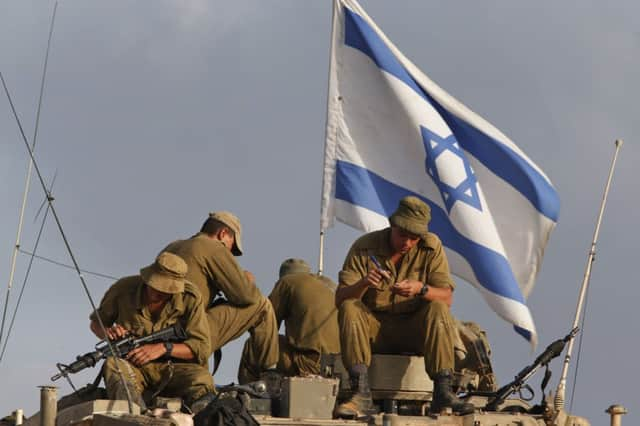Leaders: Pressure must be brought to bear on Israel


The incursion of ground troops in northern Gaza was said to be brief. But it marks an intensification of the Israeli response to more than 800 rockets fired by Palestinians deep into Israeli territory and fuelled fears of a much greater troop deployment in the coming days.
Israel has said that a ground invasion of Gaza remains an option, and it has already mobilised more than 30,000 reservists. That can only work to fuel Palestinian resistance and intensify retaliatory rocket strikes that now reach much further than within a 25 mile radius of Gaza.
Advertisement
Hide AdAdvertisement
Hide AdIt is these rocket attacks that the Israeli government is determined to stop. And while they continue, its shelling of targets within Gaza will go on, putting further civilian lives at risk.
Thus does the bloody cycle of tit-for-tat rocket and bombing attacks continue. And without the strongest foreign diplomatic intervention to break this cycle, the latest shows no sign of ending. Hostilities are still young by comparison with previous offensives. The previous outbreak of hostilities lasted eight days, while the exchanges in 2011-12 lasted 22 days.
On Friday, prime minister Benjamin Netanyahu gave a rare press conference in which he was brutally blunt about the danger he believes the state of Israel to be in. He made clear that he could never countenance a fully sovereign Palestinian state in the West Bank. His world-view is that Israel is standing almost alone on the frontline against vicious Islamic radicalism, while the rest of the as-yet free world does its best not to notice the march of extremism.
He also indicated that he considers the current American diplomatic team led by John Kerry as naïve, making plain that “no international pressure will prevent us from acting with all force against a terrorist organisation (Hamas) that seeks to destroy us”.
Operation Protective Edge would thus go on until guaranteed calm was restored to Israel. And a prerequisite for that, it seems, is a cessation of Palestinian rocket attacks.
Either the Israeli offensive in Gaza will now go on until Hamas has exhausted its supplies of air-to-ground missile hardware – the scale of which has already been astonishing – or international pressure is brought to bear. Israel well knows that despite the rhetoric of Mr Netanyahu it only has a narrow window for further military action before international opinion swings heavily against it.
For that diplomatic intervention to be effective, it needs to come from the top, it needs to be co-ordinated with pressure from Western leaders generally, and it needs to be urgent. An approach centred on de-escalation of the current rocket exchanges should be the priority before any other progress can be made in securing a more lasting truce.
A World Cup with plenty of positives
This year’s World Cup has swept all before it. Drama, excitement, upsets – and a high tally of goals – helped to draw a TV audience for the final in the Maracana Stadium estimated at one billion world-wide, who saw Germany beat Argentina 1-0.
Advertisement
Hide AdAdvertisement
Hide AdIt was not all perfect. The fouls, the ground-rolling displays of agony and the biting of opponents we could have done without. But there was far more in this brilliant tournament to inspire youngsters and for coaches to emulate. Here were examples aplenty of dazzling footwork, silky movement and mesmeric ball skills. The hallmarks of success in 2014 were surely the fast passing skills displayed in particular by Germany in its destruction of the home team, intelligent running into space and mastery of the long diagonal pass. Surely we, too, can move on from hoofing upfield in the vague hope that the ball might land near a team member.
Scotland lacks for nothing in its passion for football. The game dominates our sporting attention. And we are capable of producing players of talent and ability. But in honing that natural talent, acquiring ball skills and perfecting the quick pass attack require intensive training, coaching, teamwork and practice. And too often the game across the UK has overly relied on resort to the cheque book and the buying-in of players from overseas to lift performance.
The World Cup showed not just how well the game can be played but how engrossing it can be to watch. Its drivers are sportsmanship, intelligence and skill.
These are the positive take-aways from Brazil that our home game can work on in the new season – as well, of course, as that simple but effective shaving foam spray can to ensure players keep ten yards back from a free kick.